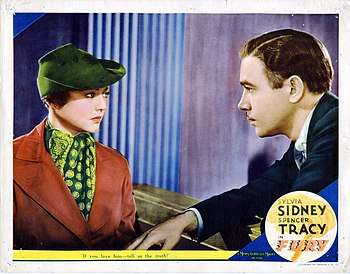Fury (1936 film)

I don't care anything about saving them. They're murderers. I know the law says they're not because I'm still alive. But that's not their fault. And the law doesn't know that a lot of things that were very important to me, silly things, maybe, like a belief in justice and an idea that men were civilized and a feeling of pride that this country of mine was different from all others. The law doesn't know that those things were burned to death within me that night.—Joe Wilson
In Fritz Lang's taut drama Fury, Spencer Tracy plays an innocent man wrongly accused of a crime. After being attacked by a mob, Joe's girlfriend (Sylvia Sidney) convinces him to take the higher road and let the judicial system take its course.
Based on the story "Mob Rule" by Norman Krasna, Fury was the first film Lang made in the United States. Although the film's dark, gritty story departed from MGM's usual glamorous fare, the film was a hit with audiences, performed well at the box office, and won an Academy Award for Best Writing, Original Story.
Fury was added to the National Film Registry in 1995.
Tropes used in Fury (1936 film) include:
- Executive Meddling: Fritz Lang wanted the protagonist to be guilty of the crime the lynch mob attacks him for (which would have been suspiciously similar to M), but a sympathetic criminal protagonist wasn't allowable under the Hays Code.
- Ripped from the Headlines: Lynch mob "justice".
This page needs more trope entries. You can help this wiki by adding more entries or expanding current ones.
This article is issued from Allthetropes. The text is licensed under Creative Commons - Attribution - Sharealike. Additional terms may apply for the media files.